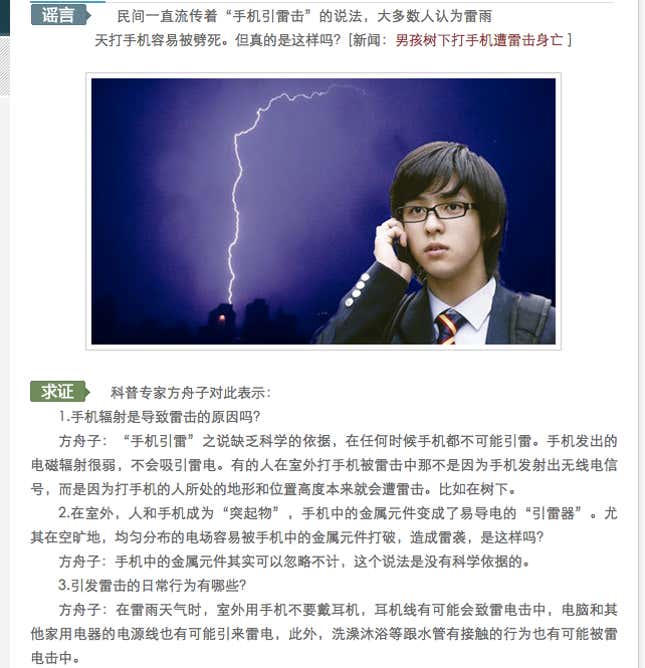If you ask the Beijing Internet Association, China’s websites and microblogs are plagued by “made-up stories, rumors, slandering, cursing, and swearing.”
Now the non-profit group, which includes some of the most powerful executives in China, has teamed up with the Chinese government and six of the country’s biggest internet companies to launch a website devoted to debunking internet misinformation. Even the world’s mostly tightly-censored internet apparently needs a state-sponsored truth squad.
So far the site features an incongruous mixture of consumer-friendly information (no, using a cell phone during a thunderstorm does not increase your chance of being electrocuted) and specific denials of wrongdoing, like buying property through ill-gotten gains, by government officials.

The Beijing Internet Association, made up of nearly 200 academics, government officials and executives from Yahoo, China Telecom, Baidu, Sohu, and other companies has paired with the new state-run Beijing Internet Information Office to run the site.
“The platform will be a new try by Beijing’s websites to eradicate online rumors and raise internet users’ awareness of telling rumors from the truth,” Chen Hua, director of the Internet information service and management department under the BIIO, told Xinhua.
Internet users and free speech experts were, naturally, a bit dubious. “The government is quite annoyed about how the spread of information is getting out of control on microblogs, so they are stepping up control efforts,” Wen Yunchao, a visiting scholar at Columbia University’s Institute for the Study of Human Rights, told Bloomberg News. “Though there’s little use in this if people don’t believe in the government in the first place.”
The purpose of the relatively new BIIO was detailed in a Xinhua article published in May (Chinese), which said little about how it would work or how many people it would employ. But it did detail the office’s vast responsibilities, which include enforcement of existing law and regulation on the internet, supervision and and coordination of departments in charge of internet control and internet crime, examination of internet news and monitoring on a daily basis, planning news websites and organizing online propaganda.
The new office is headed by Tong Liqiang, a CCP member since 1978 and a former official in Beijing’s propaganda department. Maybe it should come as no surprise that Tong is also the head of the Beijing Internet Association.
Chen Yifei contributed reporting.
